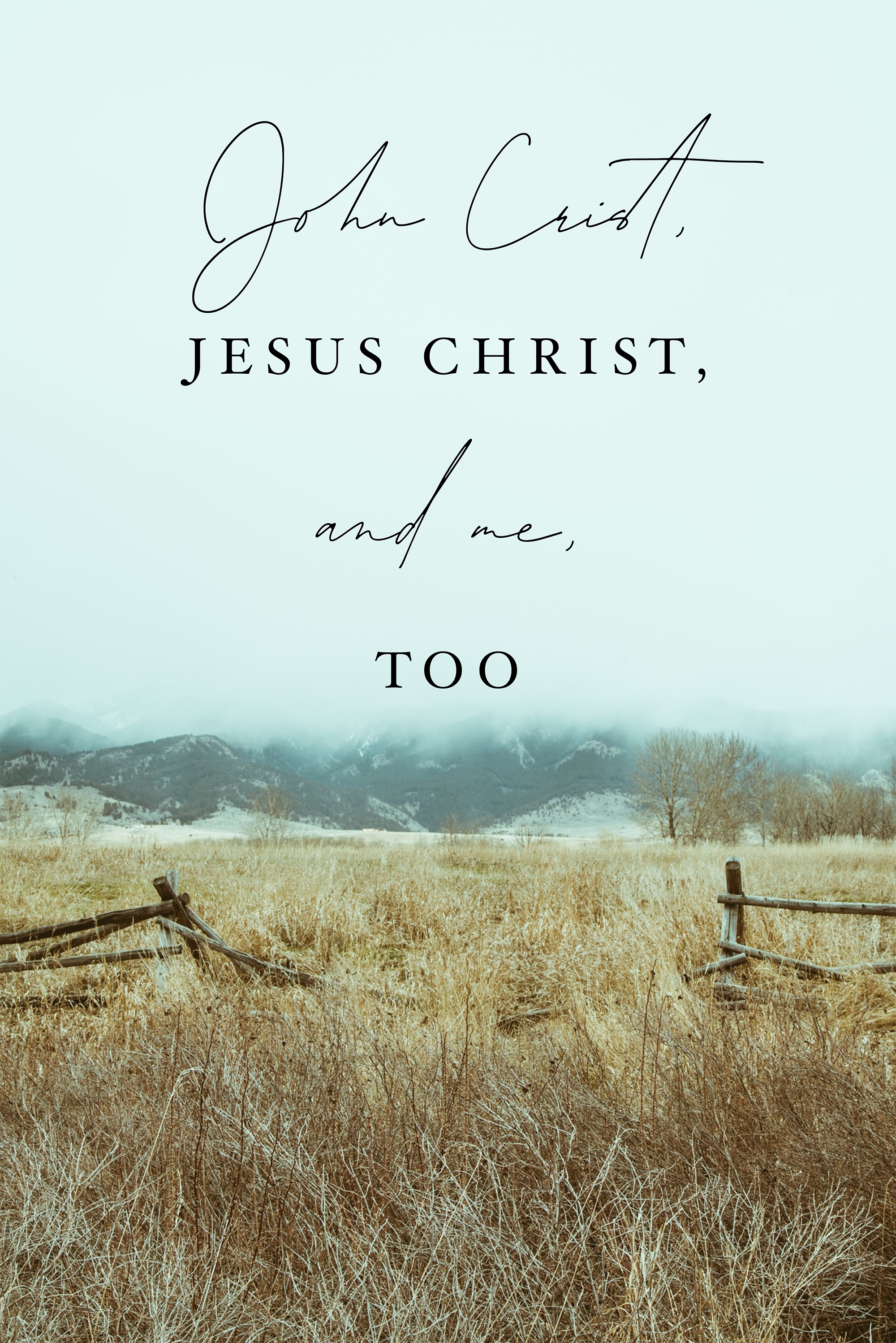John Crist, Jesus Christ, and me, too
/Tuesday morning I got an email I’d been waiting for: the pre-sale code to buy tickets for John Crist’s upcoming comedy tour in which he was finally spending a few days in the Pacific Northwest. Between my family and my in-laws, seven of us had plans to see him live. Within a few clicks I’d secured our tickets.
The next evening I got a completely unexpected email: “In an effort to focus on his health, John Crist has made the decision to postpone his 2020 tour dates.”
A quick Google search painted the rest of the picture for me.
I am heartbroken.
Heartbroken to hear of yet more women who were treated like playthings instead of people. Heartbroken to hear of yet another well-known Christian desecrating the name of Christ. Heartbroken to know that the world has more ammunition to hurl at the “hypocrites” that claim to follow Jesus, and heartbroken to know that so many Christians are simply feeding that ammunition into their hands by openly shaming a sinner while preaching grace.
If there’s one thing I know about the Church (and perhaps this could be broadened to Western culture on the whole) right now, it’s that there are acceptable sins and unacceptable sins. There are the sinners we shun and there are the sinners we seek. There are testimonies we don’t want to hear and salvation stories we’d rather silence because their content teeters toward what we consider “not okay.” Leave your sinful addictions out of it, please, until you’re completely cured - we don’t want to hear about how God is transforming you right now, it’s the finished product we care about!
But any of us who are being self-aware on this walk with Jesus know that there are no finished products this side of the Kingdom of Heaven. There are only ugly, clumsy, moment-by-moment transformations that happen with three steps forward and two steps back.
I am grieved over John Crist’s sin. But I am hopeful for the opportunity the Church has, right now, to paint a portrait of Jesus with her response. We have a choice at this crossroads: We can respond in bitter unforgiveness and total abandonment of this man and drive deep-seated shame even deeper into the watching men and women whose sins also fall under the category of “not okay,” or we can respond with the same love and grace we ourselves have received from Jesus through no merit of our own, and watch opportunities for true healing arise.
I know that we fear being seen as licentious, permissive, or dismissive of the evils that have been committed. I feel very deeply the responsibility to honor God’s holiness by taking sin seriously. But taking sin seriously does not have to mean shaming someone for what they’ve done. It is not shame that transforms people - it is forgiveness. Shame may, for a short time, inspire them to try harder to fight their sin, but Jesus didn’t come and die so that we could try harder; He came to utterly annihilate the power of sin and death on our behalf with the power of grace. There is now, therefore, NO CONDEMNATION for those who are in Christ Jesus.
One day, Jesus was dining in the home of a Pharisee named Simon - an upright and God-fearing man - when a disreputable woman came in off the streets of the city. She wasn’t invited - she wasn’t the kind of person this Pharisee would ever have wanted in his home, lest she defile his pure standing before God and render him ineligible to participate in Temple worship. But she had heard Jesus was there, and she wanted the opportunity to bless Him with a gift.
Simon could only look on in horror while this disgusting sinner defiled Jesus with her touch, her tears, her hair. The heavy scent of the perfume she used to anoint His feet couldn’t mask the odor of her sinfulness. This Man could hardly be a prophet, the Pharisee mused, or He would know this woman was a sinner.
Jesus answered Simon’s smug thought with a question: “A moneylender had two debtors: one owed five hundred denarii, and the other fifty. When they were unable to repay, he graciously forgave them both. So which of them will love him more?”
Simon answered, “I suppose the one whom he forgave more.”
[Jesus] said to him, “You have judged correctly.” Turning toward the woman, He said to Simon, “Do you see this woman? I entered your house; you gave Me no water for My feet, but she has wet My feet with her tears and wiped them with her hair. You gave me no kiss; but she, since the time I came in, has not ceased to kiss My feet. You did not anoint My head with oil, but she anointed My feet with perfume. For this reason I say to you, her sins, which are many, have been forgiven, for she loved much; but he who is forgiven little, the same loves little.” Then he said to her, “Your sins have been forgiven.” Those who were reclining at the table with Him began to say to themselves, “Who is this man who even forgives sins?” And He said to the woman, “Your faith has saved you; go in peace.”
Luke 7:43b-50
The woman in this story was unacceptable. Her many sins were on the list of “not okay” - they were the kind that made people not even want to associate with her, lest she taint them in the eyes of others or the standing of God. And yet it was not being shamed and avoided by the religious that transformed her; it was being loved and forgiven by Jesus. He responded to the holy aloofness of Simon the Pharisee with the rebuttal: “NO CONDEMNATION.”
No one took sin as seriously as Jesus: it cost Him everything. And yet no one consistently refused to shame sinners the way Jesus did, either.
When a shamed and sinful woman is offered the redemptive power of a gracious love, she transforms into a beautiful vessel of that gracious love toward others. And we have the opportunity to see this same transformation in the lives around us if only we will respond to brokenness like Jesus does.
If any of you are heartbroken by the news about John Crist, as I am, I beg you to consider a few things as you respond:
Shame drives sin deeper into secret. When we publicly shame John Crist’s conduct, we do not solve the evil or prevent anyone else from struggling with the same sins - we simply communicate that if they ever dare to be honest, we will condemn and disown them. Their sins, instead of coming into the healing light of community and forgiveness, sink deeper into the dark where they can fester and grow. Do we want to see our brothers and sisters and selves transformed and made whole, or are we more comfortable sitting here in whitewashed tombs full of rot and death, as long as the outside looks nice?
How you respond to this distant celebrity figure is training wheels for your response when the sinner is someone close to you. And one day, no matter how well-cushioned your Christian bubble, it WILL BE someone close to you. It’s very easy to drop a fallen celebrity like a hot potato and think nothing of it, but what about when it’s your child? Your sibling? Your spouse? Every person in your life is a sinner with ugly stuff in their past and present. Grace is something to start practicing NOW.
Every testimony is a testimony-in-progress. Yours. Mine. John Crist’s. When we leap over one hurdle, another is only a few strides away. This race is life-long, and if we’re waiting for the finish line to celebrate God’s work, we’ll miss out on it completely! God is working NOW, in me, in you, and in John Crist. Testimonies don’t have to be wrapped up in bows with a “happily ever after” to be testimonies - and in fact, God’s magnificence usually shines brightest when we are at our smallest. If we are faithless, He remains faithful. That is a testimony.
Remember what kind of characters make up the pages of your Bible. You need not think hard to find examples of many believers and instruments of God who had heinous sins on their record. We may be quick to throw John Crist under the bus and yet somehow manage to see men like Abraham (who sold his wife twice to save his own skin and raped his maid) and David (who abused his power in order to commit adultery with Bathsheba and then had her husband murdered to make himself look better) as heroes of the faith. The point is that no one is righteous. Were these crimes despicable? Yes. Were these men loved by God? Also yes. The same paradox is true for all of us, and this is the heart and soul of the Good News! We come with no goodness to recommend us and yet He loves us anyway, even to death.
None of this is to minimize or dismiss the pain that John Crist’s actions have inflicted. The human beings his sin has harmed matter deeply, and they too need to be received with love and care. Unfortunately, the harm done to these specific women is but one piece of what has been revealed to be a deep and far-reaching cultural wound. It touches all of us in some way, and so we cry out for God’s comfort and abundant grace.
Are you a woman who has been objectified, belittled, or used? Me, too.
Are you a person who has been disillusioned with religion because of the rampant hypocrisy you see? Me, too.
Are you a sinner who fears that not a soul would be left by your side if they “really knew”? Me, too.
Are you a Christian who has been let down by a person of faith you looked up to? Me, too.
Are you a broken human taking three steps forward and two steps back every day on a testimony-in-progress that sometimes seems like purposeless wilderness wanderings? Me, too.
Are you left with no one to hope in but Jesus, the One who already bought your victory and has declared NO CONDEMNATION over you? Me, too.









